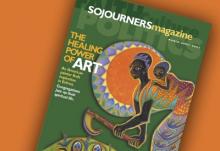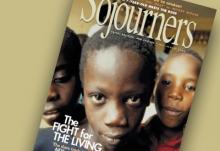Church

A national study documents what many congregations already knew—that the arts are good for faith, and faith can be good for the arts.
The Word on the Street has the potential to be a book about two theologians who volunteer at a soup kitchen, feel good about themselves, and write heart-warming stories about their experiences.

A half-century from now, will the churches finally learn to get along? We look into our crystal ball to see…
A new report shows that the current economic boom is not finding its way to the collection plate.
In all my 17 years in Mississippi, I never heard anyone say they were gay. A year ago I moved to Vermont where unmarried couples, both heterosexual and homosexual, live together without shame. The word "partner" has entered my vocabulary. I see adopted children with two mothers or two fathers.
As I awkwardly discern how to ask new friends about their lives and families, Vermont may become the first state to adopt a domestic partnership law giving same-sex couples the benefits, rights, and responsibilities of marriage. Letters pro and con fill my Burlington Free Press. Public radio aired emotional testimony on the subject from packed statehouse chambers. In our small-town church, several people walked out of a Sunday School classroom when a mother shared about her gay son and that she had testified in favor of the law.
I decided to write about Vermont's debate on homosexuality and domestic partnership in "Grace Matters." Before submitting it to the editors, I e-mailed the first draft to 200 friends, asking for critique.
The next evening 57 e-mails greeted me. Slapped me in the face, actually. And they kept coming-eventually I had more than 70 pages of responses printed in 10-point, tightly squeezed type. Old friends came out of the woodwork to offer emotional three-page opinions.
These are all friends I dearly love. All people of sincere faith. And they are deeply divided. I went to bed heartbroken.
A recent consultation among United Methodist Church officials on the "authority of scripture and the nature of God’s revelation" acknowledged that the most divisive debates of the church hinge largely on one’s view of the nature and authority of the Bible.


Peggy and Tony Campolo dialogue about the church and homosexuality.
This summer I taught two weeklong courses, one in western Canada and one in the American Southwest.
Should houses of worship and other religious organizations increase their efforts to assist people moving from welfare to work? Absolutely. Should they do so by following the model established by the charitable choice provision of the welfare reform law? Absolutely not. Charitable choice is unconstitutional, unwise, and unnecessary.
Unconstitutional. Charitable choice ignores important legal distinctions that protect religion. For many years, groups that have ties to religious bodies, but are not pervasively sectarian (such as Catholic Charities and Lutheran Services in America), have received government money to perform secular social services, provided that they do not proselytize or discriminate on the basis of religion in hiring.
Courts generally have refused, however, to permit the government to subsidize pervasively sectarian entities, such as a church or a drug rehabilitation group that relies on acceptance of the gospel. Why? The Constitution recognizes that individual citizens, not the government, should choose whether their money supports the missions of Methodists, Mormons, Baptists, or Buddhists.
It doesn’t solve the constitutional problem to restrict the use of tax money for secular purposes. In pervasively sectarian ministries, it is almost impossible and always unwise for government to try to separate sacred from secular. When government attempts to do so, it becomes excessively entangled with the ministry, which is itself unconstitutional. Charitable choice attempts to obliterate the legal distinction between religiously affiliated and pervasively sectarian institutions, allowing both to receive tax funds.
For three weeks in February 1998, a delegation of U.S. religious leaders made a historic visit to the People’s Republic of China. Selected by President Clinton and invited by President Jiang Zemin, the delegation’s unprecedented mission was to begin a dialogue with top government officials in China on the subject of religious freedom. The delegates said they knew the dangers of such a state-sponsored visit—especially the risk of co-option by their hosts—but felt they were able to voice criticisms, broaden awareness, and introduce a new perspective on religious freedom to many Chinese officials.
Rev. Richard Cizik, a policy analyst for the National Association of Evangelicals and a staff member for the delegation, said he has been preparing for this trip since reading Pearl S. Buck’s The Good Earth as a child. Cizik received a graduate fellowship to the National Political Science University in Taiwan in the early 1970s, and visited the garrison coastal islands of Quemoy and Matsu—the closest that an American with a Republic of China passport could get to mainland China at that time. "Looking through binoculars from one of the concrete bunkers built to house artillery batteries," he said, "I promised God that I would someday get to the mainland." This year he fulfilled that promise. —The Editors
"We’re here to build a spiritual bridge between the United States and China," the rabbi, minister, and archbishop calmly explained. At least a dozen reporters with cameras, including representatives of Xin Hua, the official Chinese News Agency, crowded the entryway of the White Cloud Daoist Temple to interview the highest level delegation of its kind at the start of a three week mission on behalf of religious freedom.
"Don’t you think you are being used by the Chinese government for propaganda purposes?" a reporter from Reuters inquired.
"Except my mother and me, the entire Schneier family died in Nazi concentration camps," the rabbi responded. "I know what it means to be manipulated by authorities, and that’s not going on here."
The charitable choice provision of the 1996 federal welfare reform law makes Christian ministries and other faith-based organizations eligible for government funds to provide welfare services, without requiring them to form separate corporations or remove religious content from the services they offer. We asked two experts on charitable choice to explore the issues of church-state relations raised by the provision.
—The Editors
Cooperation between government and religious organizations to serve the needy is not new. But previous federal rules for such cooperation were often so restrictive, uncertain, or arbitrary that many Christian ministries rejected federal dollars for fear of losing their spiritual mission. The charitable choice rules for federal welfare funds are designed specifically to address this fear by protecting the religious integrity of participating faith-based organizations.
Charitable choice is built on four principles. It
- encourages state and local governments to use contracts or voucher arrangements to obtain services for welfare families from non-governmental organizations;
- requires the governments not to exclude faith-based organizations from competing for funds because they are religious or too religious;
- obligates the governments to respect the religious integrity of organizations that accept government funds to provide welfare services;
- protects the right of the needy to receive help without religious coercion.
The charitable choice provision is a set of conditions on how the federal welfare block grant that each state receives can be used, not a separate fund designated for churches.